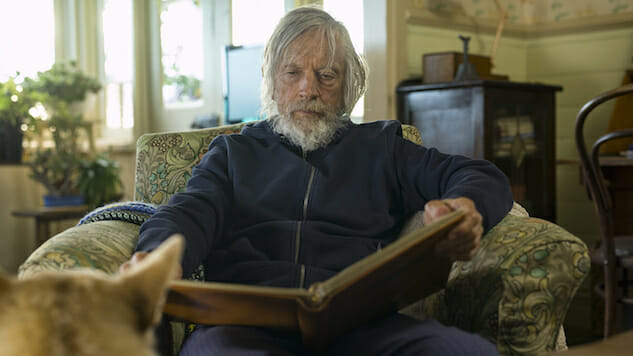The Leftovers: The Opposite of a Miracle
(Episode 3.03)
Ben King/HBO
Fear thou not; for I am with thee: be not dismayed; for I am thy God: I will strengthen thee; yea, I will help thee; yea, I will uphold thee with the right hand of my righteousness. —Isaiah 41:10 (King James Bible)
Kevin Garvey, Sr. (Scott Glenn), the crazy whitefella of “Crazy Whitefella Thinking,” comes to the home of one Christopher Sunday in search of indigenous wisdom. As with generations of white men before him, of course, Kevin prefers to press upon his host his own, self-made scripture, the missionary in a far country: He unfurls an impenetrable parable of powerful hallucinogens (“God’s tongue”) and nursery rhymes (“The Itsy Bitsy Spider”), landing on his belief that he must sing to stop the cleansing flood a few weeks in the offing. (Sunday, with a stand-up’s well-honed timing, chimes in that he specializes in bringing rain, not warding it off.) In the course of his long, strange ramble, though, Kevin describes an Outback village that seems almost familiar, from which all 14 residents, and the animals besides, vanished in the Sudden Departure: The opposite of Miracle, Texas.
“Crazy Whitefella Thinking,” otherwise so distant from The Leftovers’ main action, features more than one of these faint connections: Kevin’s calls to Matt Jamison (Christopher Eccleston), the sole extant copy of that new biblical tract, a boy’s anxious questions about John Hinckley, Jr. and the behavior of ducks. On the whole, though, it is, in its way, the series’ most radical departure yet, an absurd, anti-colonial, apocalyptic sojourn alongside an unpleasant pilgrim; the hour contains so many ominous images—sudden storms, snakes, an ark under construction—it seems almost medieval, as if the script were torn from a forgotten prophet’s illuminated manuscript. (Its closest kin is the magnificent “No Room at the Inn,” which re-imagined The Book of Job in a makeshift encampment, or perhaps the prehistoric prologue of “Axis Mundi.”) It is a challenge to watch, and thereby to write about: With so few handholds to guide us home, whether to Miracle or Mapleton, it becomes a dispatch from another world, one we may not yet wish to enter.
-

-

-

-

-

-

-

-

-

-

-

-

-

-

-

-

-

-

-

-

-

-

-

-

-

-

-

-

-

-

-

-

-

-

-

-

-

-

-

-








































